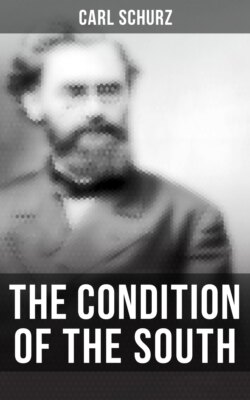Читать книгу The Condition of the South - Schurz Carl - Страница 6
На сайте Литреса книга снята с продажи.
OATH-TAKING.
ОглавлениеA demonstration of "returning loyalty" of a more positive character is the taking of the oaths of allegiance and amnesty prescribed by the general government. At first the number of persons who availed themselves of the opportunities offered for abjuring their adhesion to the cause of the rebellion was not very large, but it increased considerably when the obtaining of a pardon and the right of voting were made dependent upon the previous performance of that act. Persons falling under any of the exceptions of the amnesty proclamation made haste to avert the impending danger; and politicians used every means of persuasion to induce people to swell the number of voters by clearing themselves of all disabilities. The great argument that this was necessary to the end of reconstructing their State governments, and of regaining the control of their home affairs and their influence in the Union, was copiously enlarged upon in the letters and speeches of prominent individuals, which are before the country and need no further comment. In some cases the taking of the oath was publicly recommended in newspapers and addresses with sneering remarks, and I have listened to many private conversations in which it was treated with contempt and ridicule. While it was not generally looked upon in the State I visited as a very serious matter, except as to the benefits and privileges it confers, I have no doubt that a great many persons took it fully conscious of the obligations it imposes, and honestly intending to fulfil them.
The aggregate number of those who thus had qualified themselves for voting previous to the election for the State conventions was not as large as might have been expected. The vote obtained at these elections was generally reported as very light—in some localities surprisingly so. It would, perhaps, be worth while for the government to order up reports about the number of oaths administered by the officers authorized to do so, previous to the elections for the State conventions; such reports would serve to indicate how large a proportion of the people participated in the reconstruction movement at that time, and to what extent the masses were represented in the conventions.
Of those who have not yet taken the oath of allegiance, most belong to the class of indifferent people who "do not care one way or the other." There are still some individuals who find the oath to be a confession of defeat and a declaration of submission too humiliating and too repugnant to their feelings. It is to be expected that the former will gradually overcome their apathy, and the latter their sensitiveness, and that, at a not remote day, all will have qualified themselves, in point of form, to resume the right of citizenship. On the whole, it may be said that the value of the oaths taken in the southern States is neither above nor below the value of the political oaths taken in other countries. A historical examination of the subject of political oaths will lead to the conclusion that they can be very serviceable in certain emergencies and for certain objects, but that they have never insured the stability of a government, and never improved the morals of a people.
